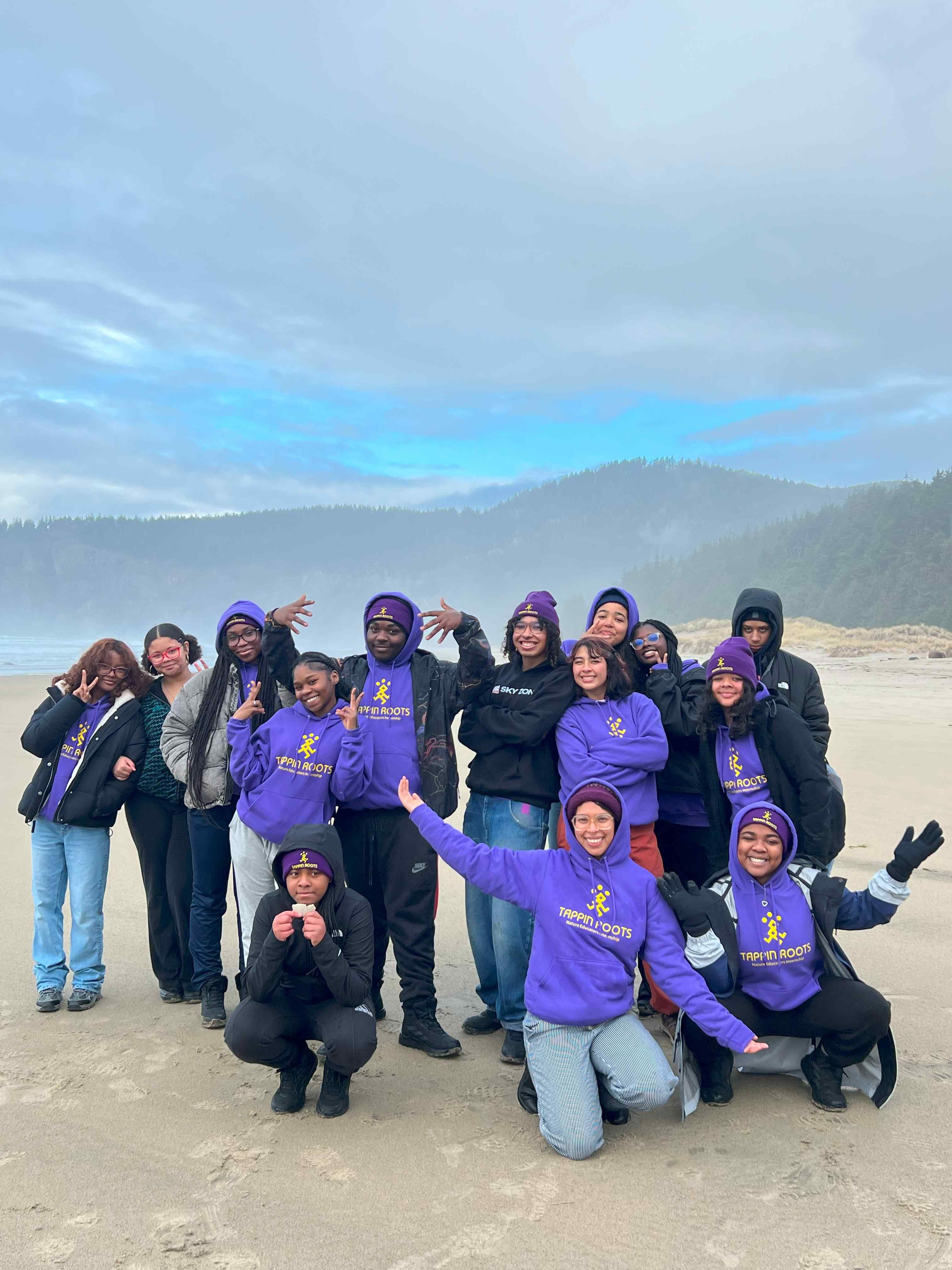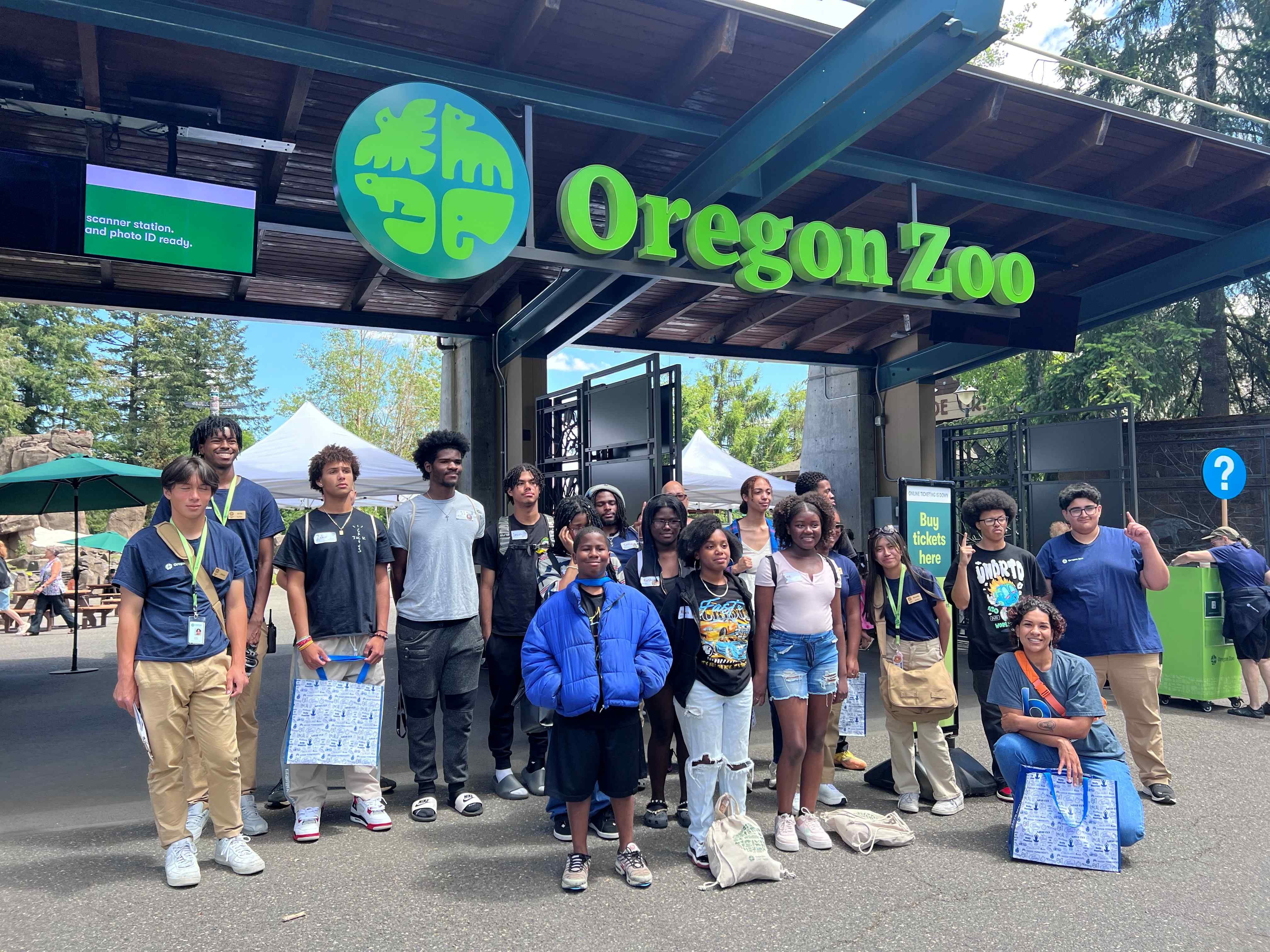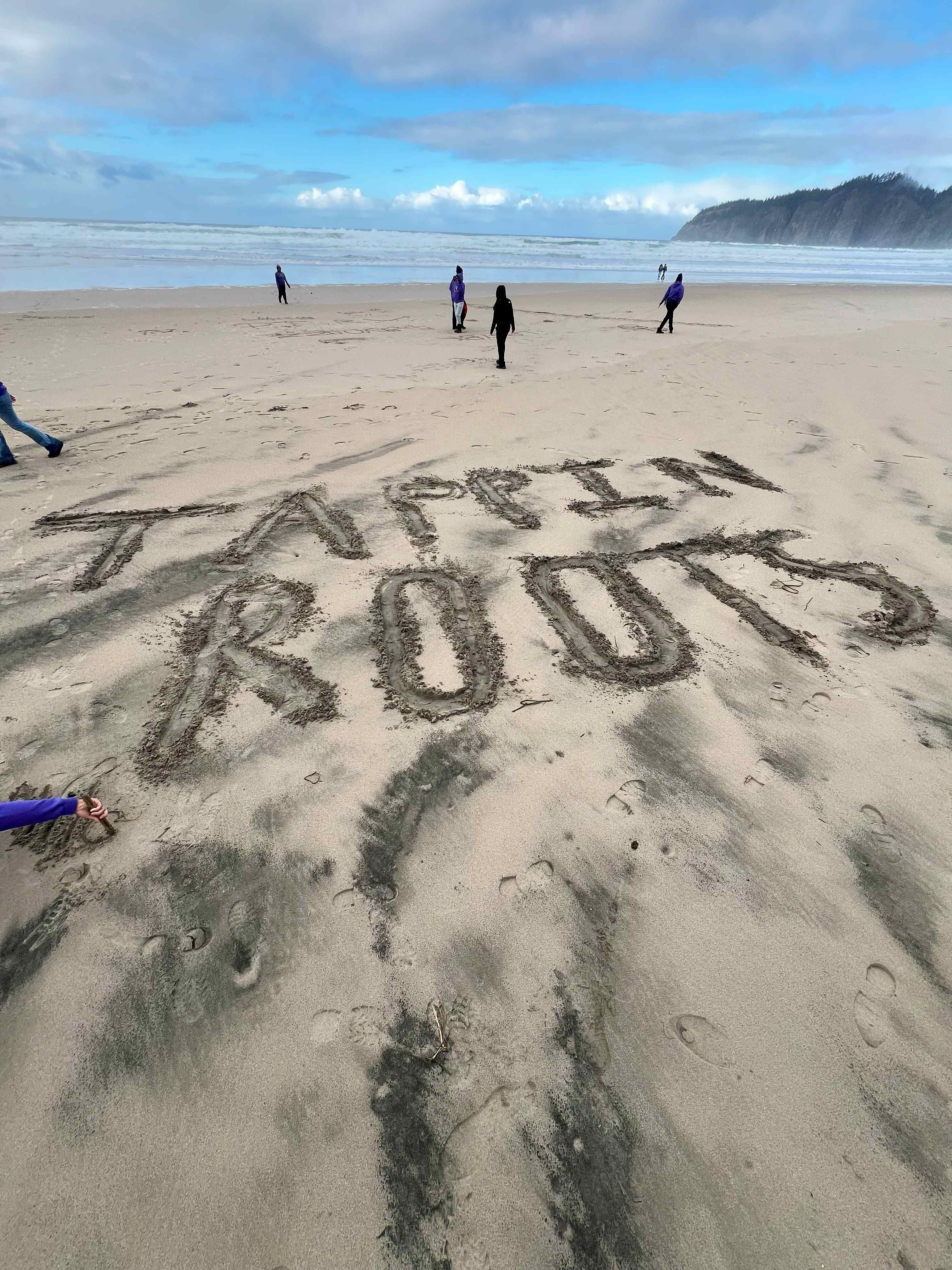Tappin Roots
A Seminal Internship Program Values Black and Brown High Schoolers and Empowers the Environmental and Community Leaders of the Future
The Tryon Creek Natural Area encompasses a 665-acre forested canyon tucked between the tony SW Portland hills and one of Portland’s most lux suburbs, Lake Oswego. The campus of Lewis Clark, an elite private college, abuts the park to the east. Within this evergreen oasis, Tryon Creek and its several small tributaries meander through the land, crisscrossed by wooden bridges and animated by frog songs.
On a Saturday in early May, on a trail glowing with new spring growth, a group has gathered to listen to Joseph Pearson talk about native plants. One-third of the audience are Black Portland high schoolers who’ve joined on a field trip with the Blueprint Foundation. Pearson is the Cultural Environmental Educator for Friends of Tryon Creek, a nonprofit that caretakes the land and offers inclusive programming. As he describes which plants are edible and which toxic, the students are rapt.
Historically, these students of color would’ve been an uncommon sight in this largely White affluent neighborhood. But a group of Portland nonprofits—including Friends of Tryon Creek, The Blueprint Foundation, and ELSO, Inc. (Experience Life Science Outdoors)—has changed the narrative about where Black and Brown students belong and what opportunities they deserve. Among the students gathered today are several interns with a groundbreaking program the organizations co-created called Tappin Roots, and they’re here not only to learn about the lemony flavor of oxalis and the toxicity of Pacific Yew fruit, but also to become the naturalists leading this walk, the directors guiding these programs, the engineers designing the creek’s bridges, and the citizens who feel at home in this treasured forest.

Jason Stroman jokes that his favorite part of his job is writing checks to kids. As the Director of Community Engagement and Mentoring for The Blueprint Foundation, Stroman has over a decade of experience mentoring Black Portland high schoolers. Blueprint arose out of a local chapter of the Black organization Phi Beta Sigma Fraternity, Inc. Mentors work with student in and out of school, frequently leading groups into natural areas to create safe, affirming experiences. “We go on camping trips; we go to the beach; we go to the mountain,” Stroman relays.
“There’s been a huge opportunity gap,” he goes on, speaking about the disparities between affluent White students and lower income Black and Brown ones. Students who can’t afford to work for free never get the gift of career exploration or the networking that comes with internships. Stroman wants kids to know, “their work has value. They have value.”
Tappin Roots was born when Black and Indigenous leaders began to dream together about an internship program that invested in and valued Black and Brown students. They saw an opportunity to fulfill their own staffing needs while exposing students of color to diverse careers, connecting them to nature, giving them entry into the green economy, and engaging them in the environmental advocacy most relevant to their communities. While they collaborated to create this robust internship program, these leaders became a tight-knit professional network—the very support system students would benefit from most.
The first Tappin Roots cohort launched in 2020. Each year, among a competitive pool of applicants, the organizers accept only 16 students. The program has three sequential phases. It starts with an orientation in January when students from across the city get to know each other and the program’s leaders. Six monthly symposiums follow. Each tackles a different theme, including basic skills like First Aid and CPR; substantive education around restorative justice, financial literacy, and Oregon’s Black history; and grounding healing practices. Students meet professionals of color at the top of their fields, who demystify how to enter careers in conservation, outdoor education, environmental justice, the trades, and other STEAM (science, technology, engineering, arts, and mathematics) fields. Critically, students receive a stipend for each symposium they attend.
The program builds to their summer internships doing nature-based education with younger students. By this point, the students know each other and the participating leaders well and self-select where they’d like to work. Tappin Roots pays interns up to $4,000 for their time, which is more than money—it’s the freedom to explore, to dream, and to map real career pathways.

ELSO, Inc. also operates at the heart of Tappin Roots. Alongside various programs, the nonprofit runs Wayfinders, a summer day camp that offers Black and Brown-identified kids joyful interdisciplinary nature-based programming through the lens of STEAM in natural areas across the city.
When the executive director, Sprinavasa Brown Turner, was a young Black college student, a counselor steered her away from pre-med. Turner loved science and dreamed of becoming a doctor, but in this decisive moment, an adult in authority who didn’t know her, her work ethic, or her intelligence with any depth told her she’d likely fail. Leaning on racist tropes, the advisor directed her to a less challenging path.
What if she’d been supported instead of dismissed? What if she’d received votes of confidence and affirmations from trusted adults who looked like her and knew her well? What if these very adults shared their networks, advice, referrals, opportunities, and letters of recommendation? What if they’d had her back?
These questions animate Turner. She and her staff are committed to educating and nurturing not only ELSO’s kindergarten through 8th grade campers but also the high school camp guides they mentor and employ.
Many of ELSO and Blueprint’s explorations take place at Tryon Creek—its own center for student and natural life. In the summer, Jonathan Hayden, the Education Programs Manager for Friends of Tryon Creek, helms eight full weeks of summer camps within this vibrant canyon. Indigenous traditional ecological knowledge anchors all of their place-based tactile lessons. Each year, several Tappin Roots interns join as camp guides. Hayden recalls one of his counselors, Raven, a Tappin Roots intern, who confided in him, “I don’t know if I can do this.” She was Black, working with a largely White, affluent group of campers. Hayden accomplished what Turner’s counselor had failed at so long ago: he showed her she was capable, smart, durable, and valuable. She became one of his top instructors, ready for the next challenge knowing that sharp, connected adults have her back.
Several of Hayden’s students have returned in subsequent years. Others have sampled work at each organization and then gone on to college and rich opportunities. “I want them to see the world,” Hayden declares. “There’s a lot of good work out there… There’s a place for you.”
Turner, Stroman, Hayden, and their fellow organizers get to know these kids intimately. They meet their siblings, their friends, and their teachers. They discover their passions, their fears, and their skills. Turner reflects, “We wanted to ensure that we had multiple touch points with the youth.” Each has written untold letters of recommendation. Many of the students have graduated and joined their ranks as mentors and leaders, strengthening the network they’re creating. A woman named Divine, who Turner has mentored since she was in the seventh grade, now works as ELSO’s storytelling and communications coordinator. Last year, Blueprint hired two former students—Josh and Lashay. Stroman describes the evolution these kids undergo as “an absolute joy to watch.”
“You plant a seed,” Stroman says. “And you have to trust. The beauty of our work is being in it long enough to see the growth pay off.”
CALL TO ACTION!
If you believe in this community-centered, equity-focused, holistic approach to addressing the environmental crises that impact us all, please follow these organizations’ work, sign-up for their newsletters, and join their events! Learn more at www.theblueprintfoundation.org, www.elsoincpdx.org, and www.tryonfriends.org.
